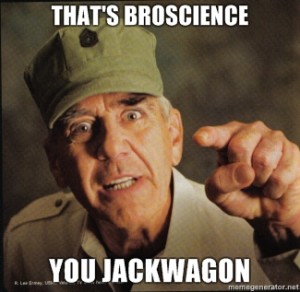I have a post coming out in a few days about bad research interpretation in the mainstream fitness media, but I want to set it up by offering a very smart researcher’s opinion.
You see, I’m a total bro.
I believe that the pump equals growth. I believe that hunger is a sign of a diet working. I believe that a good arm workout can cure depression. Well, it works for me at least.
I believe these things because it’s what I’ve experienced in my many years training and living the meathead life.
However, there comes a time for the bro in all of us to grow up and venture away from Experience Street and see what’s going on down on Research Avenue.
Bryan
Experience & Research — Where Geek Meets Muscle
A Guest Blog by Dr. Mike T. Nelson
I live at an interesting intersection — where experience meets research.
At least it’s interesting if you like receiving messages from coaches saying you’re full of crap and they have 15 more years experience than you.
And they’re correct – on the number of years part. No matter what I do, coach X will always have 15 more years at it than me.
However, I’m more interested in what they’ve found to work with their athletes, not how many years they’ve been doing it. After all, I know people that have been doing the same job for decades and still suck the hind teat.
And I get similar emails from those on the other side — researchers with many more publications than I do. Wow, that’s awesome, but I’m more interested in what they’ve learned in their significant career, not the number of pubs their lab cranked out.
Collision Course
Research and experience seem to be on a collision course, hell bent to destroy the other. Trying to ride both of these proverbial horses with one ass isn’t easy. No matter how hard you try to accommodate everyone, someone on either end of the spectrum will make your life difficult.
You’ll never have enough studies to “prove” your thoughts to the hardcore research people. And you’ll never have enough years of experience or pro athletes under your banner to “prove” your methods to the hardcore, in-the-trenches coaches.
The Rub
Here’s the rub — we need both research and experience.
Research is a guide to a better understanding.
Experience is a guide to seeing what works on your athletes/clients.
In other words, both research and experience are tools to get better results with your clients. Which is what they pay you for. Which is all that really matters.
Results

Results is the favourite word of every in-the-trenches coach.
“Piss on your studies. I got 20 years experience, a wall full of trophies, and a pretty sweet squat. I gots results!”
Listen — and this is for all you bros, including the esteemed old bro who agreed to publish this guest post for me — your n=1 experiment only applies to you.
It doesn’t mean it applies to everyone. It doesn’t mean the white lab coat research geeks are all wrong because they never lift.
N=1 applies to you, under whatever circumstances happened. While that’s useful, it’s not the be-all-end-all, nor was it ever intended to be.
Know Your Limits
So all the bros should start reading PubMed, right?
Well, not everyone is cut out to be a research-reading, 4-plate benching, PubMed assassin.
Bobby Big Gunz 23 probably doesn’t understand the limits of the abstract conclusion he just read. He’s not trained to analyze studies objectively – ask him about “validation” and watch his head explode like a large pimple in a minefield of backne on his winged scapula.
What’s validation? If I wanted a super tight internal validation on a new metabolic study, I would lock people up in a metabolic chamber where literally everything was controlled.
The exact amount of calories in their food would be monitored and weighed to the tenth of a gram. All their movements would be tracked. The air in the chamber would even be monitored for oxygen and carbon dioxide entering and leaving, which provides clues about the percentage of fat and carbs being consumed by their metabolism.
This study would be excellent at getting down to the mechanisms that control metabolism.
The flipside is that studies like the example above are horrible at being transferred to where the rubber hits the road – the real world. Where the average person considers a 64-ounce Slurpee and two Twinkies a light snack.
So metabolic ward studies like the one above aren’t invalid, they just can’t be transferred to free living humans.
There’s a limit every time you run a study. If you chose to do X many times you can’t do Y.

In my Monster Energy Drink study published at JISSN — shameless plug I know, but it cost me 5 year of my life, hence, I’ll torture you with it — I performed a ride time-to-exhaustion (TTE). By virtue of using that method, I couldn’t do a time trial format.
While the study didn’t show an increased TTE, that can’t be extrapolated to mean that Monster Energy Drink won’t be better in a time trial format.
You can run down the list of other possible reasons — the amount of caffeine used, the subjects enrolled, etc. In the end, I had to make what I felt was the best educated choice based on the current literature.
No one study should be expected to change everything in an industry, which is why a consensus of the literature is needed. And even that will be heavily debated (and for good reason)
Finally — Why You Should Give a Rat’s Ass
When you work with clients, it happens in the real world.
Research is a guide as is experience.
Neither is “perfect.”
Read the research, learn how to run a basic study, spend the time to know the limits of what it’s telling you. Yes, this means you need to read more than 1 study — and it has to be the full study.
If you’re not sure and you don’t have a research background, ask a researcher.
I know that’s an appeal to an expert and is not the uber-highest level of evidence, but it is a notch up from where you were at. Don’t turn your brain off when they answer. Think about it. Ask questions, read another study. Yes, this is work unless you’re a geek like me that reads them for fun.
On the experience side, don’t let the research entirely hold you to running the same experiments over and over. Research is never complete and many times they only reported on the mean (average), which is a topic for another day.
Use research as a guide but not as loud, hard fast rules that can never be broken.
If you don’t understand the mechanism, it is perfectly fine to say, “I don’t know.” Some of the smartest people I know use that phrase a lot. It’s okay.
In my book, even speculation is okay — as long as you state it’s speculation! Don’t take the yellow brick road of broscience and state it as fact when you think mTOR means “my Targeted Origination Receptor.”

To Recap: Here’s How to Be a Smarter Bro
* Read more research – not just the damn abstract.
* Ask yourself questions.
* Seek professional advice.
* Ask them questions
* Experiment more.
* Set up your best guess (hypothesis) and find data. It may never be statically valid but it is a start.
* Know your limits.
Editors Note: Or just get jacked as fuck. At least that’s relatively easy.
Bio

Dr. Mike T. Nelson has been in college way too long to the tune of 18 years and several hundred thousand in education bills. He has a BA in Natural Science from St Scholastica, an MS in Mechanical Engineering (biomechanics) from Michigan Technological University, and a PhD in Exercise Physiology form the University of Minnesota. He has published research in both engineering and physiology journals.
He currently teaches for Globe University, works with clients from all over the world and does actually lift.
Get his free 6-part video fat loss course at http://www.miketnelson.com

